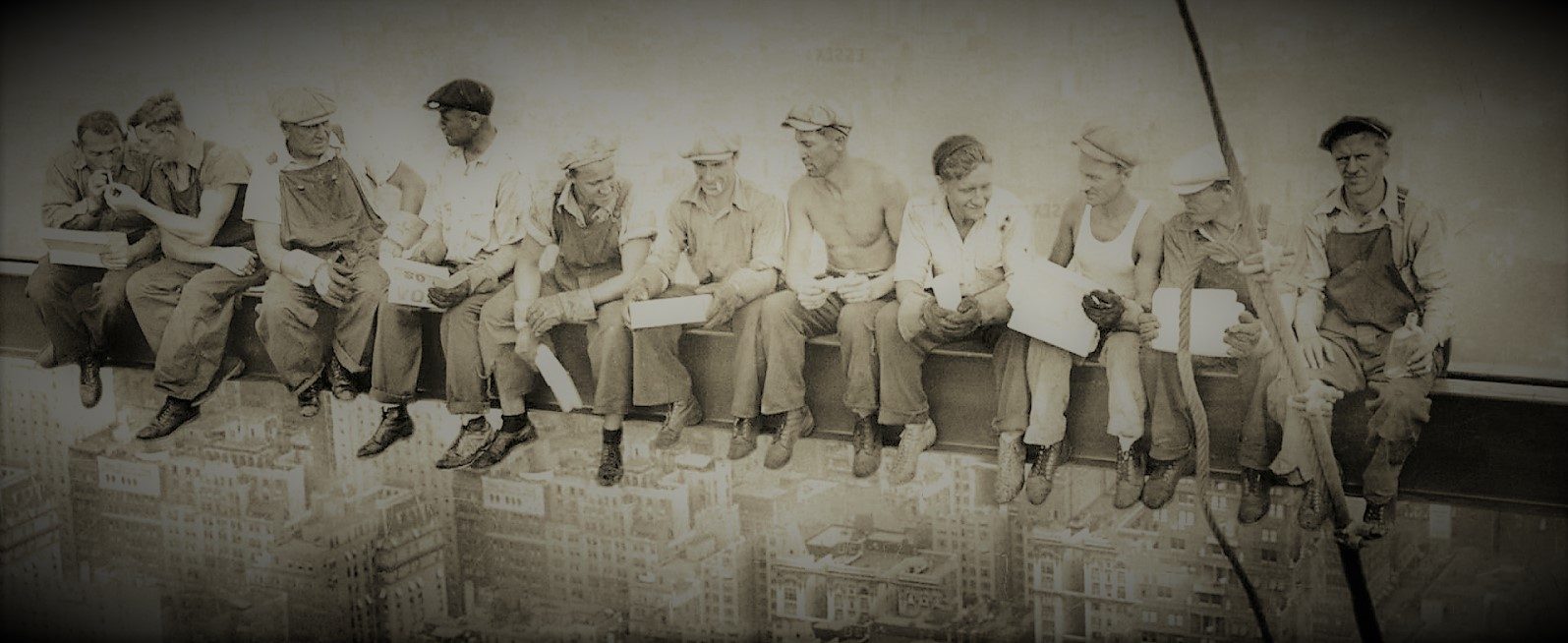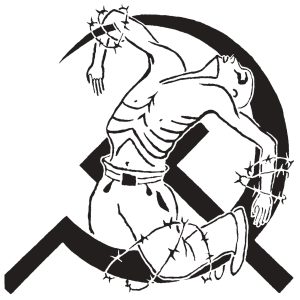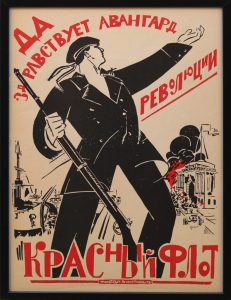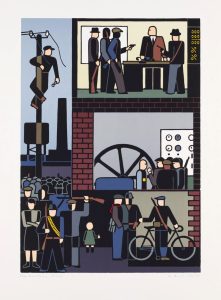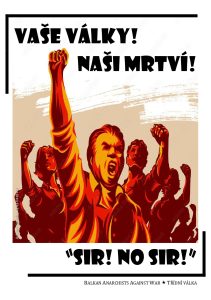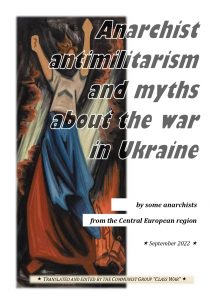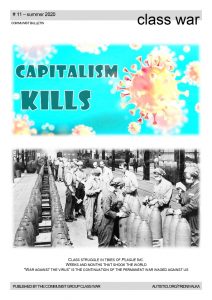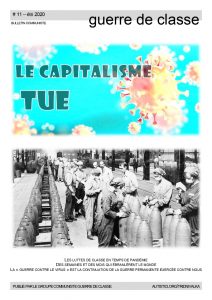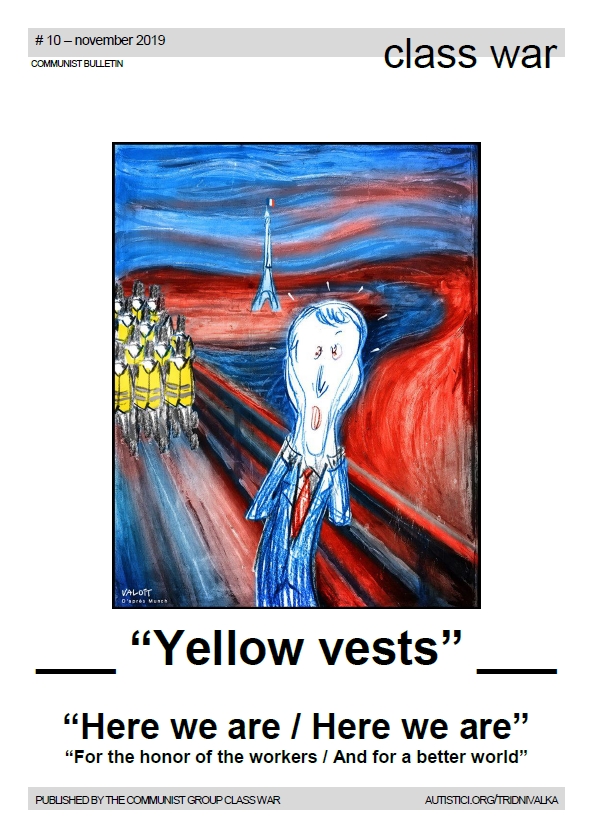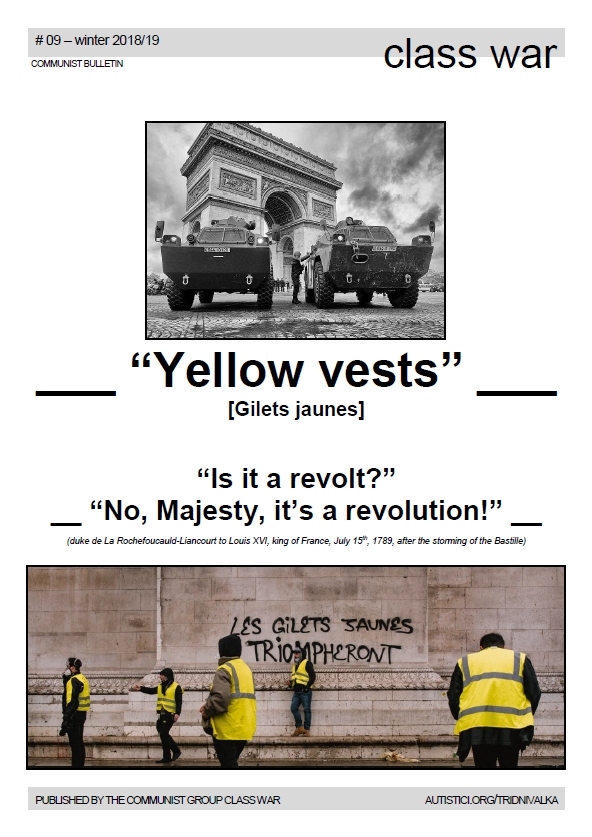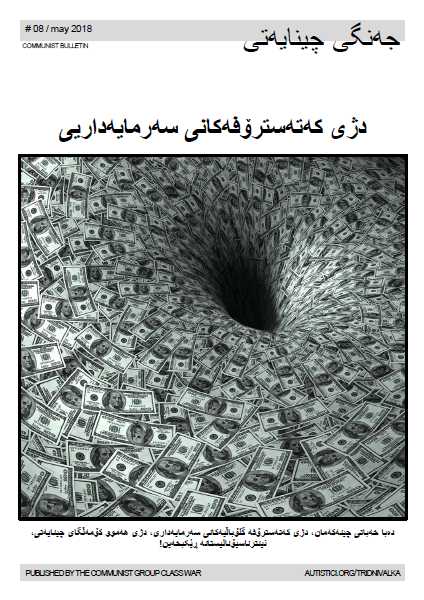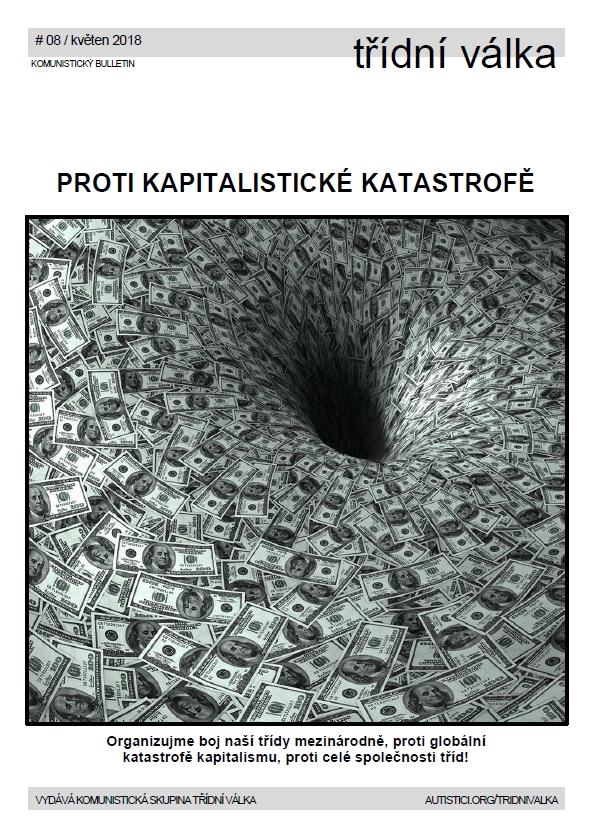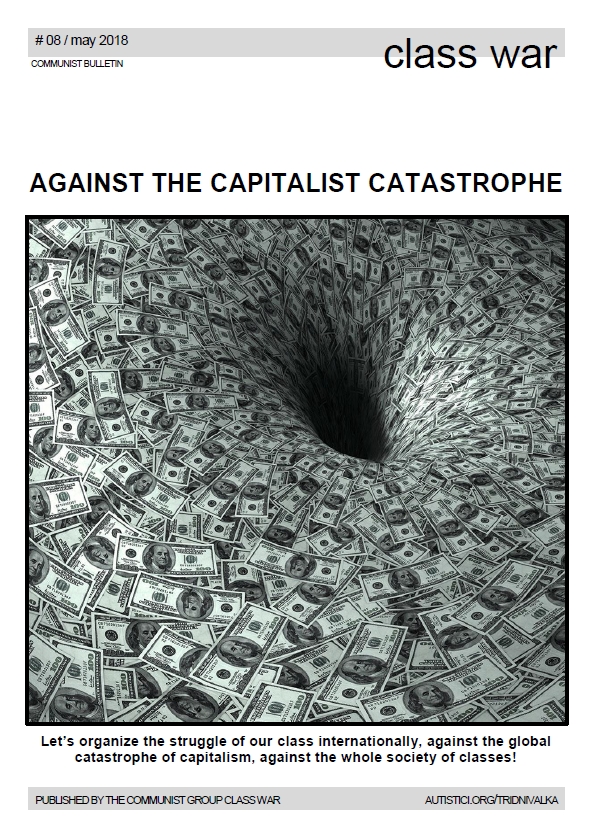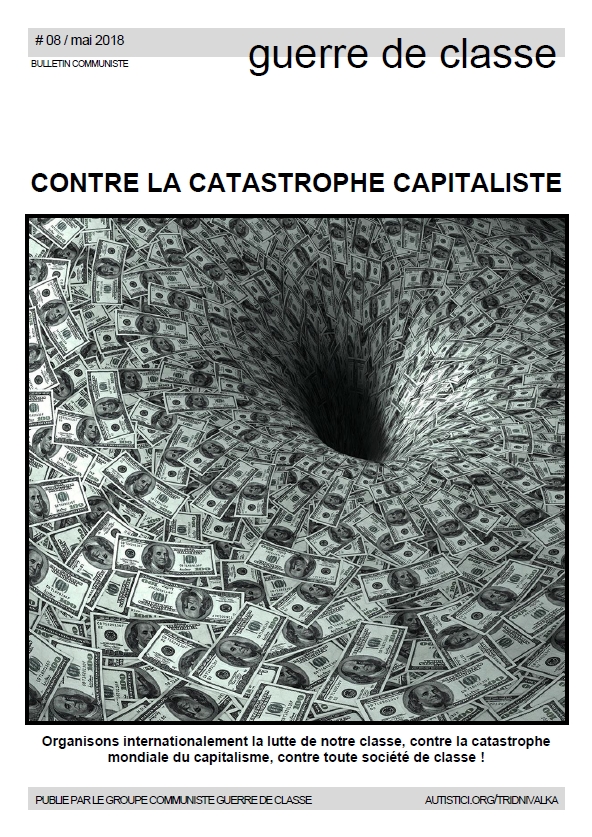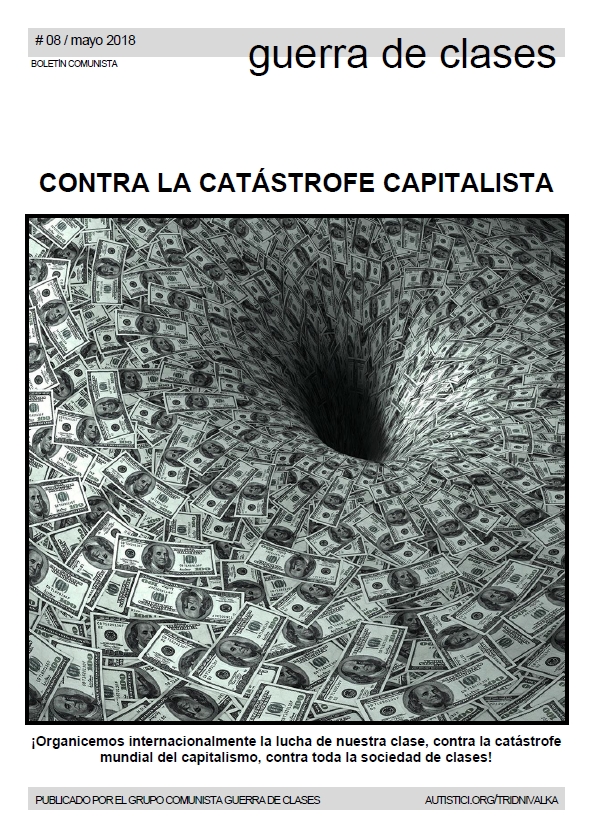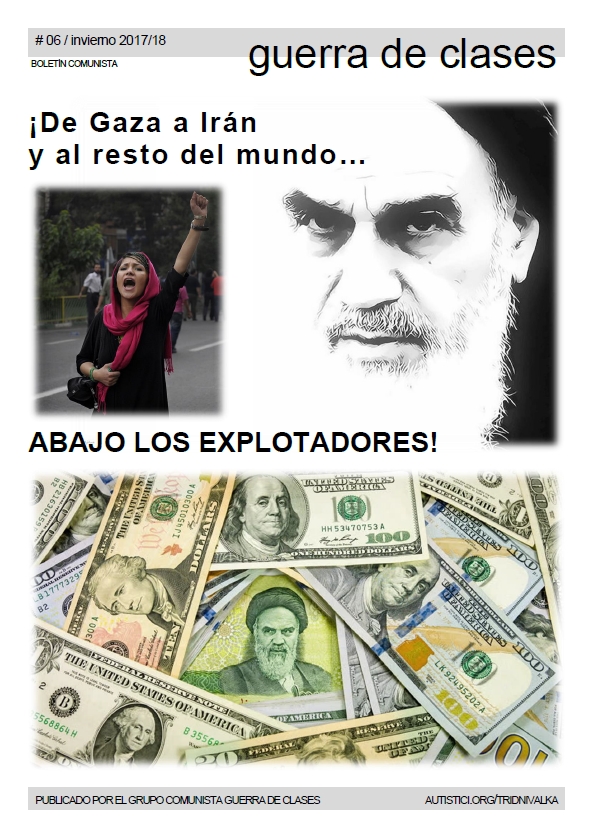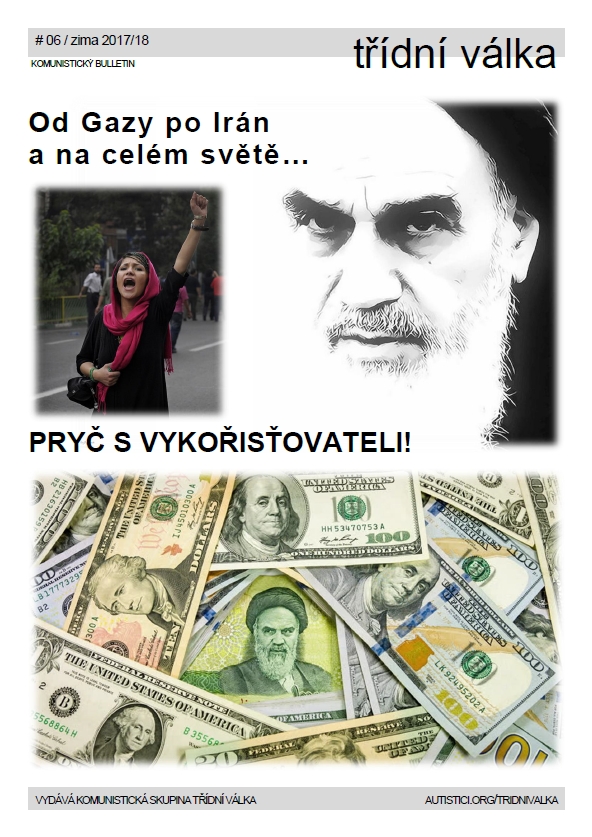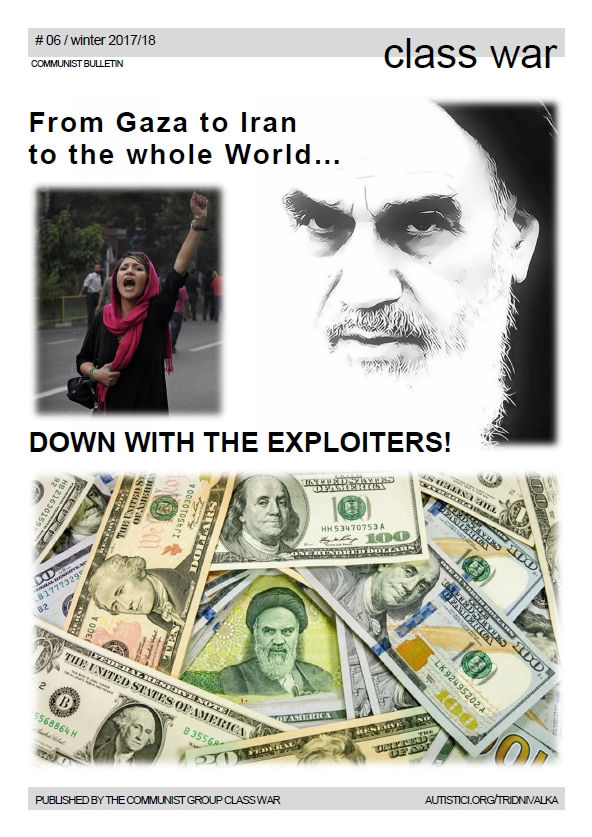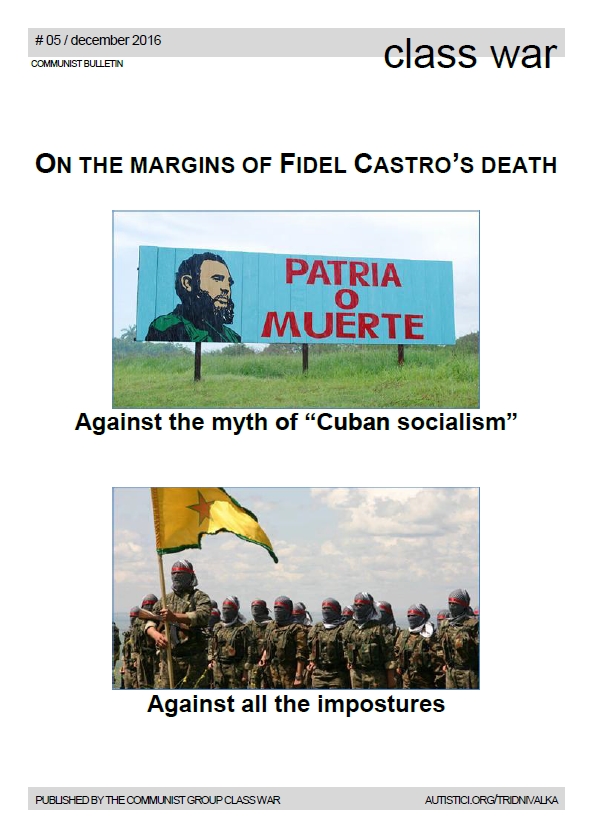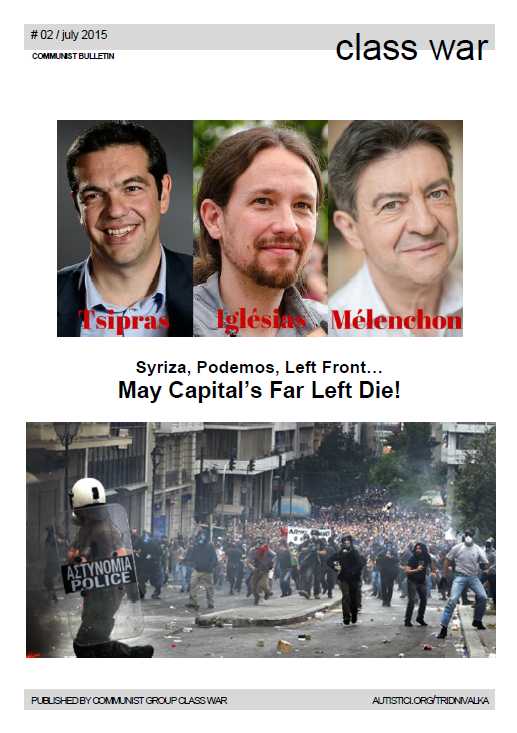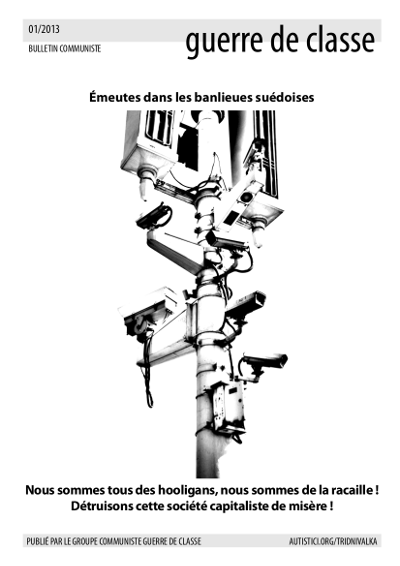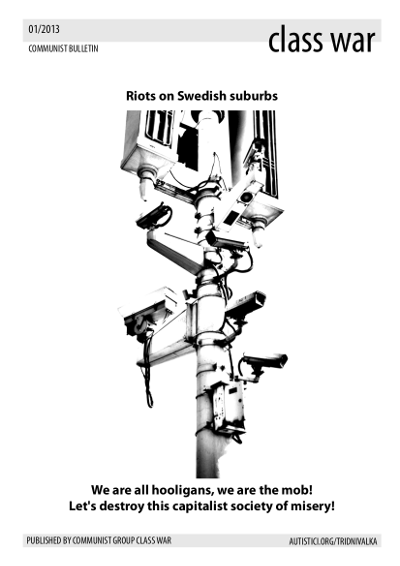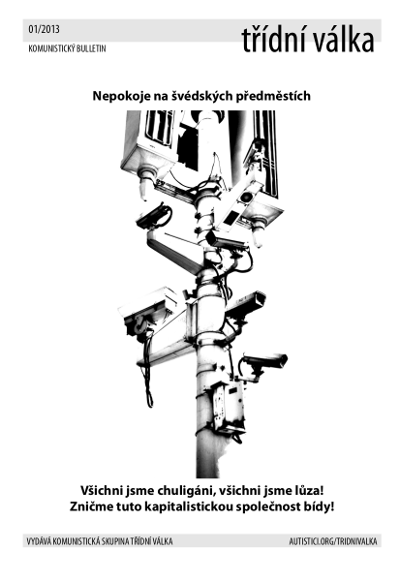/ Français / English /

Source in French: Groupe Communiste Internationaliste, Le Communiste No.25, November 1986
As a part of our critique of “decadentism”, which we grasp as a set of ideologies that disguise/break the historical antagonism between proletariat and bourgeoisie, we wanted to address one of its variants, particularly defended by leftists (Trotskyists, Stalinists, Bordigists, Maoists…): the theory of imperialism as the “highest stage of capitalism”. It’s not a matter of criticizing anti-imperialism as a category of political economy including the danger of leading proletarians astray from the path of revolution. The issue is to see it as a material force leading workers to their atomization and destruction in the competitive struggles between bourgeois fractions. Defining imperialism as the highest stage of capitalism, as does any decadentism worthy of its name, means to bring about a rupture in the program of capital, both in time and space. Theorizing about an imperialist stage in the development of capital, while proposing to assume “new” tasks justified by the opening of a “new” period, is above all to endorse the “old” practice… In 1914, the most radical of the social-democrats, faced with the existence of the counter-revolutionary program of the Second International, wanted to “start afresh”, but without taking stock of the previous years, without critically examining their own activity within the counter-revolutionary organization. To avoid this critical assessment, they elaborated a series of theses showing that capitalism have reached its “highest stage” in order to theorize a new orientation in assuming the proletarian tasks from or around the sacrosanct year 1914: for revolution through reform (!) before 1914, for revolution against reform after 1914!!! Social-democrats can thus continue to claim the “glorious past” of the Second International, asserting that pre-1914 reformism was merely a means to an end: communism. But the reality is the opposite of what it seemed: communism – grasped here as an ideology – was merely the means to bring workers to fulfill the reformist agenda of the bourgeoisie. Not making that critique results in not breaking with social-democratic practice!
A rupture in time, but a rupture in space too, the struggle against imperialism implies that some countries are more imperialist than others. Anti-imperialism is thus the best way to defend the “weakest” country, the most “oppressed” nation. The struggle of class against class becomes an interclass front to safeguard the nation “oppressed” by the “enemy financial oligarchy”, the new leftist sport of determining which nation is the most imperialist in each war. But there is no such thing as the “most imperialist” nation, because it is in the essence of every nationalism to dream of transforming itself into an empire. Imperialism is never a question of countries. Every nation is imperialist by definition. Leftists take advantage of the situation in which one of the capitalist competitors is in a bad position, to make fools falling into the trap of war against the “most aggressive” nation. In this way, leftist fractions are the perfect complement to “right-wing” nationalisms; the trap closes and the proletarians are sent to slaughter.
“Imperialism, the Highest Stage of Capitalism” is the bedside book of anti-imperialists: it was written by Lenin during the First World War, in the spring of 1916. Lenin based his work on the book by English economist J.A. Hobson, who denounced imperialism from a point of view taken up by the socialists, especially Hilferding. The social democrats had openly demonstrated their counter-revolutionary nature by calling for the military mobilization of workers behind “their” respective national flags. Lenin was easily able to denounce the “present” of social-democratic practice in 1914. His understanding of the historical class nature (yesterday-today-tomorrow) of the Second International was quite different. Lenin, like most decadentists, saw social-democratic organization as an expression of the struggle to improve workers’ living conditions within the framework of capitalist development and progress. Decadentists do not question this framework: for them, when social peace reigns, based on the previous crushing of the proletariat and the subsequent phase of capital valorization, it’s a question of fighting for reforms, and it’s in this sense that parliamentarianism and syndicalism have been able to find, in their eyes, a historical justification. Where current Leninist and decadentist conceptions differ is in assessing how long the post-1914 period of decadence will last. For Lenin, the highest stage of capitalism, the monopoly stage, meant, in the conditions it created for communism, the short-term collapse of the whole of society. For him, imperialism was the dead end of capitalism:
“… we must define it [imperialism] as capitalism in transition, or, more precisely, as moribund capitalism.” (Lenin, “Imperialism, the Highest Stage…”)
What all leftists will subsequently theorize is an ideology that is nothing more than an extension of Lenin’s theories or, more precisely, a development that leads to today’s shifting “anti-imperialist” constructs, with its litany of support for one bloc over another, in short to “anti-imperialism” as a strategy of struggle against the “big capitalists” – in other words, to the program of reform (armed or unarmed) of capital based on the polarization of proletarians into opposing camps. If Lenin’s theory differs from that of the leftist preachers in its evaluation of the period to which his book refers to, his general vision of society, as a justification for his practice, provided the basis for the later wild imaginings of the “little red bureaucrats”. In his own way, Lenin expresses social-democratic continuity. In his denunciation of the bankruptcy of the Second International, he regards the warmongering practice of the Social-Democratic International as nothing more than a betrayal, and this is how he avoids criticizing the origin and bourgeois nature of social democracy. He criticizes the consequences, not the essence, of the practice of the reformist organization. He refuses to see in it the development of the political apparatus of the ruling class during a period when the crushing of the struggles dominates and reformism rhymes with progressivism and positivism, as ideologies linked to a phase of capital’s expansion. Books are the product of history in the most general sense, but they also often justify their author’s little story; Lenin’s theory of imperialism is nothing more than an attempt to justify in another guise (an anti-imperialist one!) nationalism, war, reformism… the disappearance of the proletariat as the subject of revolution. Once it’s been established that the theoretical arguments of Lenin, Hilferding, Kautsky, Luxemburg… are underpinned by their “leftist” social-democratic practice, it remains to examine and criticize – in order to destroy – the eco-political categories and principles that all leftists use today to enroll proletarians in wars, each more nationalistic than the last.
>>>
Leninist-decadentist ideology is based on a fixed vision of the contradictory tendencies of capitalist development. Lenin observes a phase of increasing concentration of capital, combined with a greater tendency towards the formation of monopolies, but by eliminating competition as a contradictory tendency to this formation, he turns a given moment into a general law of the subsequent development of capital. He thus heralds the catastrophic collapse of capitalism on the basis of a permanent (but momentarily more marked) phenomenon of valorization/devalorization contradictions, and this imperialist stage must then determine a revolutionary path in opposition to the reformist practices justified by the “progressive stage” of capital. Imperialism is denounced as the extreme limit of capitalism considered “economically” and, as a good dichotomizer, Lenin gives us the “political” equivalent of this limit: opportunism, as the misguided political attitude of the leaders of the Second International. All this slicing is completed by the “sociological” basis the author intends to give to this political opportunism: the “workers’ aristocracy”, that “privileged upper stratum of the proletariat in the imperialist countries [which] lives partly at the expense of hundreds of millions in the uncivilized nations” (Lenin, “Imperialism and the Split in Socialism”, October 1916). Lenin’s entire political thesis is based on a conception of communism linked to that of social democracy, which saw in the capitalist socialization of the mode of production a step towards socialism, and in progress, science and capitalist development the path leading straight to classless society. For Hilferding – the socialist on whom Lenin largely relied to support his position – the monopolistic tendency could lead to the constitution of a general cartel capable of consciously regulating all capitalist production and thus overcoming “the anarchy” of the mode of production; this hypothesis leading, of course, in his vision of perpetual progressivism, to rendering the revolutionary solution of the contradictions of the existing social order superfluous, and enabling the peaceful transition to socialism! Here again, without in the least questioning the reformist foundations and therefore the political implications of such a hypothesis, Lenin merely proposes a left-wing version in which, behind the description of the agony of capital, the halt to progress, the putrefaction of society… lies an apology for the development and socialization of the capitalist mode of production. Lenin does not criticize progress, but the halt to progress. Thus, there is real continuity between Hilferding’s description of “organized capitalism” as the first stage of socialism and Lenin’s description of the monopoly stage of capital as the anteroom and condition for the transition to socialism.
“In other words, the old capitalism, the capitalism of free competition […] is passing away. A new capitalism has come to take its place, bearing obvious features of something transient, a mixture of free competition and monopoly. The question naturally arises: into what is this new capitalism “developing”?” (Lenin, “Imperialism, the Highest Stage…”)
Lenin himself replied, “Towards socialism”, because “imperialism has […] objectively created all the preconditions for its achievement” (Lenin, “The Socialist Revolution and the Right of Nations to Self-Determination”, January 1916)1. His vision of a socialism that had been made possible and facilitated by the “reinforcement of the monopolistic character of capital”, by the “socialization of the means of production”, by the force of progress and bourgeois science, will lead him – when the proletarian insurrection has momentarily won out in Russia [sic! CW] – to practically apply this lack of rupture with capital’s reformist projects: after the generalization of the insurrection had been broken by the grim Brest-Litovsk agreements (among other things), Lenin advocated the development of “state capitalism at the service of the people”, taking Germany in particular as an example of economic development providing, through its high level of technicality and robustness, all the guarantees of a rapid transition to socialism.
“To make things even clearer, let us first of all take the most concrete example of state capitalism. Everybody knows what this example is. It is Germany. Here we have “the last word” in modern large-scale capitalist engineering and planned organization, subordinated to Junker-bourgeois imperialism. Cross out the words in italics, and in place of the militarist, Junker, bourgeois, imperialist state put also a state, but of a different social type, of a different class content – a Soviet state, that is, a proletarian state, and you will have the sum total of the conditions necessary for socialism.” (Lenin, “The Tax in Kind”, 1921)
To insist on defining capital as “monopolistic”, and to see in this ideological qualification the step that brings us closer to socialism, is merely a way of camouflaging behind a new category of political economy, the apology… of capital, and that’s it! By seeing “monopoly” capital as the anteroom for communism, both negatively – because the tendency towards monopoly would render competition superfluous and thus cause the catastrophic collapse of capital – and positively – because techno-scientific progress and the socialization of the means of production carried out by capital would facilitate the communization of the world – Lenin confuses capital’s chronic inability to manage itself… with proletarian revolution! For communists, the development of the productive forces and the difficulties of managing capital are only conditions for revolution; the only revolutionary factor, the only real gravedigger of this society of atrophied humans, the only bearer of the catastrophic collapse of capital is the proletariat in action. Capitalist progress is only the progress of civilization, of the ever more terrorist transformation of men into citizens. The project of progress and science is never the humanization of society; the motor of progress and science is valorization, with each scientific advance, each additional advance, chaining man ever more closely to work, in line with the permanent reform/maintenance of the wage system. The bourgeoisie only concedes progress when it knows that it will gain more and more the ability to control proletarians’ desire to struggle. Science and progress have nothing to do with knowledge and the conscious advancement of society. Like Religion and Reaction, Science and Progress are white terror, anti-communist terror. Lenin never managed to understand and act on the gap and rupture between the struggle for communism and the development of capitalist progress. He didn’t have to wait for the introduction of the Taylor system to be convinced of the validity of bourgeois science and progress; in 1905, he put it this way:
“But we Marxists should know that there is not, nor can there be, any other path to real freedom for the proletariat […], than the path of bourgeois freedom and bourgeois progress.” (Lenin, “Two Tactics of Social-Democracy in the Democratic Revolution”)
Lenin and all those who – whatever their tendency (Maoists, Bordigists, Trotskyists, humanists, fascists…) – worshipped him and sanctified him as an untouchable old man, never understood that by supporting capitalism, by contrasting one period of its development with another, by contrasting progress and putrefaction, ascendancy and decadence, birth and obsolescence, by determining particular tasks before and after “the year 1914”, they were only justifying and thus participating in a whole part of the work of reforming capital. To “break” organizationally and formally with social democracy, without programmatically drawing up a critical assessment of the conceptual past on which this rupture is based, is to let in through the window the weaknesses we think we’ve thrown out through the door.
>>>
In defining imperialism as the highest stage of capitalism, and in the new political tasks conferred to revolutionaries in this period, Lenin exposed and justified a priori the limits that the Bolsheviks will exponentially manifest in organizing the continuity of revolutionary struggle, once the insurrection has been accomplished.
“[…] we must give a definition of imperialism that will include the following five of its basic features:
(1) the concentration of production and capital has developed to such a high stage that it has created monopolies which play a decisive role in economic life; […]” (Lenin, “Imperialism, the Highest Stage…”)
For Lenin, the decisive role played by monopoly determines a particular stage of capitalism: the one leading to its catastrophic end. The “new” capitalism is opposed to the previous epoch in that it tends to completely deny the free competition, a specific feature of “old capitalism”.
“The old capitalism has had its day. The new capitalism represents a transition towards something. It is hopeless, of course, to seek for “firm principles and a concrete aim” for the purpose of “reconciling” monopoly with free competition.” (Lenin, “Imperialism, the Highest Stage…”)
“Irreconciliation”, “cesura”, these are the words used by Lenin to describe the relationship between the “epoch of free competition” and the “monopoly stage”. The error is above all methodological: Lenin takes a predominant tendency at a given moment in capitalist development and transforms it into a constant, uncontradicted law, unilaterally determining the future of society: “competition has turned into monopoly”, and this is what must determine (with a helping hand from the proletariat anyway!) the collapse of the system. But to unilaterally oppose monopoly to competition is to forget that competition is the motor of valorization… and therefore of the tendency to monopoly! To consider the tendency to monopoly as the highest state of capitalist development is to envisage the impossible development of capital through the elimination of its contradiction, its movement. Kautsky grossly described this utopia: ultra-imperialism – the highest “highest stage” of capitalism! – would make the end of wars possible through the conscious and organized sharing of exploitation throughout the world, on the basis of a “single world monopoly”, a “single world trust”. Lenin criticized this vision from a left-wing point of view, i.e., without leaving the terrain of political economy. Kautsky was merely expressing, in reverse, the consequence of capitalist development without contradiction: for him, monopolism leads to a capitalism that has perfectly mastered “the anarchy of production”, and for Lenin, this smooth tendency towards monopoly leads to the fatal collapse of the system. Behind the optimism or pessimism of the envisaged consequences, Kautsky and Lenin demonstrated the same lack of understanding of the relationship between the interplay of competition and the tendency towards monopoly. If competition does indeed lead to the concentration of production, through the elimination of the weakest, the concentration movement itself tends to be more and more negated by competition. The tendency towards monopoly is therefore always relative. Thus, the concentration of capital at the end of the 19th century and the beginning of the 20th was matched by the creation of joint-stock companies, where a new fragmentation of ownership led to new levels of competition. It is therefore quite absurd to say that “competition has turned into monopoly”, for if the constitution of huge companies holding at a given moment a monopoly of production or distribution in a given sector is an obvious fact, it is just as certain that most of these “monopolies” and the agreements between capitalists that underpin them are not eternal and evolve through new data, new markets, giving rise to a questioning of previous agreements, calling for new contracts, and thus an exacerbation of competition between capitalists! As Marx pointed out in “The Poverty of Philosophy”, monopoly and competition are not mutually exclusive:
“In practical life we find not only competition, monopoly and the antagonism between them, but also the synthesis of the two, which is not a formula, but a movement. Monopoly produces competition, competition produces monopoly. Monopolists are made from competition; competitors become monopolists. […] The synthesis is of such a character that monopoly can only maintain itself by continually entering into the struggle of competition.”
This competition exists at all levels: between monopolies of the same or different countries, within monopolies themselves… All the theories on imperialism, taken up with some variations by all contemporary anti-imperialists, have in common the interpretation of a trend towards the concentration of businesses as an irreversible evolution towards a single form of economic organization: the monopoly. They lose sight of the only revolutionary factor in society, the proletariat, and “compensate” this sidelining of subversive forces by creating a new category of political economy: monopoly, as a “decadent” force driving capital to its own downfall. Leftists are not dreaming: they know that capital will never collapse due to the “metaphysical” fact of its own contradictions. The thousands of Maoist rags that resurface every time the class struggle flares up, didactically explaining the immanent collapse of the capitalist system through the thought of “Mao Tse Tung”, have the sole function of diverting the proletariat’s historical tasks into the immediacy and concreteness of reformism. Through their apology of the theories of the final and dying stage of capital in their “citizen’s digest”, in which Lenin’s finest pearls are selected (thanks for the work!), these leftists encourage revolts for the final struggle (which is an immediate one for them!) whilst digging the grave of the revolution through the discouragement that can only result from the illusions of brighter future by the too credulous rebels. The proletariat won’t let leftist and ultra-leftist priests make it believe in their holy decadence, and it’s in the heat of the class struggle, through armed strikes and the organization of subversion, that it will shake up the leftist cops, along with economic categories, philosophical principles, religious dogmas and other scientific laws. The only purpose of all this bourgeois ideological hotchpotch is to convince the proletariat, through gross determinism, of the irreducible nature of society’s “destiny”, and to make us forget that, in the final analysis, the revolution will be what the proletariat makes of it!
“(2) the merging of bank capital with industrial capital, and the creation, on the basis of this “finance capital”, of a financial oligarchy; […]” (Lenin, “Imperialism, the Highest Stage…”)
Here again, compelled at all costs to find elements that would enable Lenin to demarcate “the epoch of imperialism” from “the epoch that preceded it”, he went fishing for a find in Hilferding’s theory: finance capital. Lenin used this new category of the economy to explain the domination of money over the world… without seeing that this concentration of money, as a factor of domination, has reigned against humans since the origins of commodity exchange, and that the money community existed long before capital existed as a world community. The fact that this domination of commodity relations over the human species is growing exponentially does not constitute a qualitative change in the nature of this domination, and therefore in no way justifies any new tasks for the organization of the struggle against capitalist dictatorship.
As for the financial oligarchy, this vision of a small group of economically super-powerful capitalists determining the social and political course of the “nation”, corresponds well to Lenin’s vulgar materialist vision of capital. Capital is seen as a sum of machines, men, things, value… and not as a social relation. The bourgeois are thus not understood as personifications objectified by the capitalist social relation, as managers of the social system that dominates them, but as evil masters consciously leading the world to its doom, dictating their grim wills to political puppets, with all that this implies in terms of a moralistic, managerialist vision of reality. To define monopoly capitalists as the new kings of the (economic) world, imposing their laws on political leaders, is once again to introduce a dichotomy into the permanent interdependence and interaction of the different management functions of the capitalist social relation. Lenin took a one-sided view of the relations of influence between what he called the “financial oligarchies” and the “political spheres”, and failed to see the ever-increasing interpenetration of interests animating business and government circles. There are no more “new” capitalists than there is a new capitalism. This flatly sociological conception of reality obviously has a thousand implications: denouncing the “financial oligarchy” as responsible for the workers’ misery. It’s reducing the struggle to destroy capital as a social relation to a problem of capital management: today’s leftists have updated the theme by calling on workers to denounce the richest “100 families” in each country as responsible for “economic inequality”. The Bolsheviks also had their political version: their slogan during the demonstrations preceding the October uprising was: “Down with the 10 capitalist ministers”… as if, with them down, money had been abolished. We’re of course convinced that the “100 families” and the “10 ministers” will block the road to the organization of a classless society. But the essence of the dictatorship of capital cannot be summed up in a few of those who personify it: the bourgeois State expresses above all the domination of value, as the profound being of society, determining the bourgeoisie’s organization in full force. It is the law of value that must be destroyed, and to do this, denouncing its managers is not enough, nor replacing them with “revolutionaries” or “workers”, however convinced they may be of the validity of their intentions, since the latter, by simply occupying the State, would only be obeying the injunctions of the class that has organized itself there, and would ultimately only be providing it with a more radical endorsement. Destroying the bourgeois State is the only revolutionary perspective, and it has nothing to do with the right or wrong distribution of wealth. Destroying the State can only mean organizing the destruction of value through the progressive abolition of wage labor! The proletariat really attacks the State when it brings this perspective to its struggle, when it goes on strike without taking the national economy into account (i.e., sabotaging it) and when it refuses to feed capital with its living force. At that moment, all the foundations of capitalist society are shaken, from the “100 families” to the trade unionists and leftists, including all the forces that try to maintain the bourgeois State in place. By struggling outside and against all State structures, by attacking commodity exchange, by confronting all bourgeois fractions defending the national economy, the proletariat breaks the chain to which our class is attached and which the leftists intend to hold, the chain of a better management of labor and a fairer distribution of its product. The very necessities of the struggle make it clear that the proletariat’s aim is not to eliminate a few defenders of wage-labor, but to abolish wage-labor itself!
“(3) the export of capital as distinguished from the export of commodities acquires exceptional importance; […]” (Lenin, “Imperialism, the Highest Stage…”)
When characterizing the “old capitalism, when free competition held undivided sway” as “the export of goods”, and the “new” capitalism “when monopolies rule” as “the export of capital”, Lenin was merely continuing his untiring pursuit for novelties that are specific to the age of imperialism, and which ultimately idealize the past, the 19th century, in order to disguise the invariant content of proletariat/bourgeois self-organization. Yet the whole process of generalizing capitalist development to the whole world shows that capital is inherently imperialist: the attraction of value to those places where the possibilities of valorization are the greatest, is a permanent feature of capital. Value, like nature, abhors a vacuum: it invests wherever the conditions for valorizing the new capital obtained seem the most attractive. This tendency to expand initial capital, this tension towards monopoly (and the competition it brings to capitalists!) has always existed, and it is in no way characteristic of any “progressive” phase of so-called “free trade” capitalism. Capital has never developed in one country and then abroad, so much so that it’s impossible to define capital from a national point of view, even if contradictions between competing capitalists lead “national” governments to defend one or the other with protectionist measures aimed at repressing the “natural” expansion of big capital. The export of capital thus characterizes nothing but… the development of capital itself from its very origins!
“If capital is sent abroad, this is not done because it absolutely could not be applied at home, but because it can be employed at a higher rate of profit in a foreign country.” (K. Marx, Capital Vol. III Part III)
The quest for the profit has always determined capital to expatriate and invest wherever it has the best chances of getting knocked up. Capital has always been imperialist. Its terrorism is wielded outside national borders.
“(4) the formation of international monopolist capitalists associations which share the world among themselves, and
(5) the territorial division of the whole world among the biggest capitalist powers is completed. […]” (Lenin, “Imperialism, the Highest Stage…”)
History has decided on its own: the formation of capitalist monopolies sharing the world has led to new wars between the various monopolies, and thus to a redistribution of capital between the various capitalist fractions, large and small. Once again, it could not be otherwise, because the driving force behind capitalist concentration is competition, and the needs of capital are insatiable. To freeze the development of capital in what Lenin called its “highest stage” – imperialism – Is to bring about the necessity of a struggle against, and therefore also between, the great powers. Such a conception implicitly expresses the shift from the struggle of class against class to the support for war, nation against nation. The book that Lenin and all his contemporary leftist apologists present to us as a popularization work is nothing but a self-justification of his change of position on war and class struggle. It’s quite remarkable that he managed to write a book dealing with the development of capitalism and its catastrophic end, without once mentioning the proletariat. His entire thesis appears to be a justification for the disappearance of the proletariat as the subject of revolution, which then depends on the enemy’s state of forces, on its economic policy and its political economy. Lenin identifies the proletariat with the civilized workers of the great European industrial centers, communism with the national-socialization of the means of production, and revolution… with a peace without annexation. When demanding a “just” peace, it is quite simply the imperialist peace that is being proposed, i.e. a white peace, leaving each nation, on the basis of the ruins caused by war, with the same possibilities for “rebuilding the country” – meaning for exploiting the proletariat. In the same way, the slogan about “the right of nations to self-determination” is nothing but a demand for the possibility for each particular capitalist group to freely exploit “its” proletarians. In 1907, before he was completely “Stalinized”, Radek had defended the only class position on the national question against Lenin: he had pointed out that faced with any position in favor of the establishment of new border posts under the guise of national self-determination, the only acceptable watchword for the proletariat was “No Borders!”. To imagine that “the territorial division of the whole world among the biggest capitalist powers is completed”, is to deny competition, the movement of the poles of concentration of capital, the class struggle… and imperialism, i.e. the permanent will of each grouping of capitalists to extend its borders and its economic power beyond the limits set by previous wars. It is absurd to consider as definitive the last division reached by the capitalist predators. Capital is movement: it moves, invests and concentrates according to existing possibilities for valorization. The great powers remain powerful only as long as they manage to maintain a sufficiently high rate of profit to continue promoting their expansion, their imperialism! Capital, however strong it may be, if it cannot be invested in the right place at the right time, will collapse as quickly as it grew. Unable to invest in a market, or to develop productive forces to promote valorization, capital shifts and goes elsewhere to spread the macabre smell of money. This is how capital was able to turn Portugal into an economic desert, even though it was one of the greatest powers of the 15th and 16th centuries, and how, on the other hand, it built the powerful Israeli capitalist faction on a desert! Turning a desert into a point of concentration/centralization of capital, and transforming an economic power into a ruin, is the permanent shifting reality to which the implacable law of value development subjects the world. To come to the defense and support of “small capitalist countries” crushed by “imperialist mammoths” is nothing but the reinforcement of capital as a global social relation. The proletariat has no place on the terrain of capitalist competition; to support a clique of exploiters who are taking a beating from other stronger capitalists… is first and foremost to support one’s own exploitation as a class, even if it is carried out by “small” bosses. Nicaragua’s proletarians have had time to realize this, and for having committed themselves to the struggle waged by the bourgeois faction opposed to Somoza, they are now paying for their mistakes by being subjected more than ever to the terror of the new “red” generals who have arrived in government and who, as a reward (apart from photos of Sandino and red flags) have offered them Saturdays of voluntary work to rebuild the “country”, “homeland or death”… Competition between capitalists is not the terrain of class struggle. But anti-imperialists have a rather peculiar conception of competition: they only speak of competition when the different fractions in struggle start out with relatively equal chances, and if this is not the case, the inter-capitalist conflict will be described as a phenomenon of domination of one country over another, as a national oppression suffered by an entire people and therefore determining specific tasks for the local proletariat! It’s a cheap trick: while not denying the existence of inter-capitalist competition, where the proletariat doesn’t have to support one side more than the other, there would be no problem for workers’ participation in war when the blatant disadvantage of one competitor over the other would imply proletarian support! Depending on different ideologies, the various anti-imperialist sects present this support as being more or less critical, momentary, tactical… and that once the new power is established, the proletariat can resume its autonomous struggle against the exploiter. The countless wars of liberation have practically demonstrated that once the new organization of the capitalist State is implemented, the proletarians enrolled in the progressive camp are incapable of confronting it, all subjected as they are to the anti-imperialist ideology and terror which now forces them to work on rebuilding “their” bloody “new” national economy!
All wars are against the proletariat! Whatever the martyrs the leftists are trying to make us weep over in order to get us to espouse their holy cause (Allende, Romero, Sandino, Lumumba, Aquino, Ali Bhutto, etc.), each time it’s a question of sending workers to fight against each other for interests that are not theirs. The perspective of the proletariat is the abolition of exploitation, not its transfer, even momentarily, into the hands of new managers. Algeria, Vietnam, Nicaragua, Angola, Zimbabwe, Cambodia, Portugal, the Philippines… are all examples of wars of national liberation that led to the establishment of new red regimes terrorizing the proletariat and benefiting from the wonderful pretext of blackmail: if you don’t march hand in hand with “people’s democracy”, you’re fighting “against socialism”! Who can mention a war of national liberation in which the proletariat has won anything? Making from anti-imperialism a separate issue can only lead to workers throwing themselves into the jaws of nationalist wolves. May leftists die!
Anti-imperialism: the worst product of imperialism!
Imperialism has existed since the birth of exchange and the emergence of class societies. The will of private owners to conquer the wealth of neighboring owners is inherent to the existence and development of money. Imperialism is in no way a particular feature of capitalism; capital has merely generalized the brutal will of value to valorize itself and invest itself by all means wherever its dictatorship can be exercised to its greatest advantage. Imperialism is neither a defect of capital, nor an unpleasant manifestation of the excesses of some of its cruelest managers. As long as we do not restrict it to a category of political economy, imperialism expresses the capitalist essence in that it is ruthless competition between capitals, and competition is the substantial motor of valorization, its way of life.
“Conceptually, competition is nothing other than the inner nature of capital, its essential character, appearing in and realized as the reciprocal interaction of many capitals with one another, the inner tendency as external necessity.” (Karl Marx, Grundrisse I)
The global nature of capital means that it is directly imperialist. The world market is the field of capital’s expansion and, at the same time, its limit; the wars that take place within this framework express the desire of different capitals to expand and valorize, while at the same time essentially attempting to destroy the proletariat as the sole revolutionary limit to the development of capital, which is imperialist in any case. Anti-imperialism, as conceptualized by liberals and leftists alike, is limited to a critique of competition when the balance of power is too favorable for one of the protagonists. Anti-imperialism then appears as the ideological justification of the crushed competitor, the better to disguise the crushing of the proletariat in and by the warlike relationship of the whole bourgeoisie at war, whether they are of equal strength or not! Left-wing and right-wing bourgeois set their trap off by urging us to choose between both capitalist sides. But between two gangs, there is no “lesser evil”: weak capital (which is conveniently “anti-imperialist”) remains the murderer of the proletariat! The worst thing between two bourgeois camps… is to choose one! The whole of anti-imperialism can be summed up in the permanent transfer of the contradiction between classes to that between nationalist gangs. Anti-imperialist critique reinforces and supports the predominance of the inter-bourgeois contradiction to better achieve the atomization/destruction of the proletariat in and through war, nation against nation. Anti-imperialists hide the only proletarian perspective in the face of war with the “red tone” of their discourse: revolutionary defeatism.
Anti-imperialism starts from a reformist critique, whether armed or not, of capital’s excesses: we’re not struggling to destroy one or another of the most brutal manifestations of capitalist hell, but we’re struggling against the social relations inherent in it, against the exploitation of the proletariat by the global bourgeois State, against the terrorist law of value. Imperialism and anti-imperialism are the right and left udders of capital. It attempts so to keep the criticisms levelled against it within the framework of the permanent development/maintenance of wage slavery. To imperialism, capital “opposes” the framework of its own alternative and proposes its own eco-political categories to understand and reform it. To fascists, conservative protectionists, hardliners, imperialists, reactionaries… capital shows the inverted but sadly complementary image of its bleating doves, its cynical humanists, its pragmatic progressivism – in short, of its leftist cops. The reformist critique of capital’s excesses has asserted itself in a thousand and one theories, each as obsolete as the next. Anti-imperialism, as a category of political economy, is rooted in Sismondi’s work. In his view, competition does not lead to equilibrium and well-being, but to the misery of overproduction. As capital is only concentrated and invested in certain specific locations around the globe, this “unequal distribution of wealth” results in under-consumption, which in turn is the cause of over-production. Sismondi is the founder of this concept of unequal exchange, which is widely held today, and which attempts to imply that proletarians in countries where enormous amounts of capital are concentrated exploit proletarians in “underdeveloped” countries through the mechanism of so-called unequal exchange. Third-Worldists and anti-imperialists are the main defenders of this thesis. They “forget” two things: 1/ commodities are always sold at their value, i.e. in relation to the quantity of abstract, social, human labor crystallized in them, and 2/ it is the world market that abstracts the quantities of labor concretely fixed in such and such a commodity.
“Modern” anti-imperialists have taken up Sismondi’s theories and applied them to what they call “developed capitalism”: the unequal distribution and ever-increasing accumulation of capital lead to a fall in demand and in the rate of capital expansion; as there are no longer any solvent consumers [i.e. with strong purchasing power], imperialism emerges as a manifestation of the desire to conquer new markets. All this ideological hodgepodge for leftists in search of ideologies, is based on conceptions which, as we have seen throughout this text, are limited to a critique of capital within and in defense of capitalist relations of production. Behind their criticism, whether maudlin or armed, of capital’s aggressiveness, the leftists are leading proletarians into the trenches, reinforcing the pressure of the guns pointed at their backs by the gendarmerie. Caught in these tentacles, the workers have only one prospect: to turn the guns against all their enemies, whether they wear uniforms or disguise themselves as “communists”. Anti-imperialism is not a war against war, but another way of participating in imperialist war.
Decadentism: the senile disorder of social democracy!
“The Zimmerwald movement had already asserted that the world crisis was determined by imperialism, and had explained that “imperialism” means the historical period of national and international monopolies, that imperialism means exactly the overcoming of free individual initiative. The entire movement that followed and culminated in the formation and expansion of the Communist International is based on this essential thesis, the economic character of an essentially Marxist value. If you don’t accept this thesis, you can’t belong to the International, you can’t be a communist or a revolutionary. The affirmation of this thesis is the affirmation of the existence, on a world scale, of the economic prerequisites, the objective conditions necessary and indispensable for the advent of communism. […] Capitalists want to undo the social organization born from the imperialist phase insofar as it contains the vital impetus towards communism.” (Gramsci, “Defeat” in “L’Ordine Nuovo”, April 5th, 1921)
Gramsci’s decadent pearl evokes Lenin’s conceptions of imperialism, only slightly more crudely reiterating his nonsense. Here we find the widespread social-democratic vision of capitalism as having uncovered “the objective conditions indispensable for the advent of communism”. Revolution is now only a “subjective” question. The conquest of power (either armed or unarmed) by the “party” and the management of the existing mode of production by workers’ councils. The development of mankind’s material forces reveals ever more clearly the horrible absurdity of a world increasingly incapable of meeting man’s most basic needs, but this society cannot be reduced to the neutral “objectivism” with which the Stalinists systematically describe the development of capital’s productive forces. Communism requires the destruction of capitalist “objective” forces. The latter are “conditions” for revolution only in terms of obstacles! Bourgeois progress (which includes the development of productive capacity for capital) is opposed to communism! In glorifying bourgeois progress, even before 1914 (!), the various schools of decadentism inevitably fell back into glorifying managerialism, progressivism, gradualism and positivism. By justifying their formal rupture with social democracy on the basis of a new period bringing new tasks to light – “revolutionary at last” (!) – the decadentists expressed their support for the development of capital during the long nights of counter-revolution, and prevented any real assessment of the revolutionary activity of the years of social pacification that preceded 1917-1921. The bourgeoisie was thus able to develop its political apparatus against social war, within and through the support it gave to social democracy. The framing of combative workers by reformists destroyed the proletariat’s impulse to get organized as a class. In opposition to decadentists of all stripes, we strongly reaffirm that the rupture in the tasks undertaken by the revolutionary movement is neither “periodical” nor “geographical”; it is essentially and permanently social and programmatic. The struggle between two classes with antagonistic projects and needs creates an opposition, a constant war in which, at no time, whether in a revolutionary phase or a period of social peace, does the proletariat have an interest – from its point of view – in supporting part of its enemy’s program: bourgeois progressivism is nothing but progress in counter-revolution. The structures set up by the bourgeois State to frame the workers, yesterday, today and tomorrow, cannot be the object of any support (tactical, critical or otherwise). Every social need – and the need for struggle is the proletariat’s vital need – is matched by the bourgeoisie’s need to respond in its own interests. Capital’s strength lies in its ability to hijack and transform revolutionary symbols, structures, flags, watchwords and energies into their opposite. The bourgeoisie’s need to manage/arrange exploitation and to respond in every way possible to the revolt against it is as permanent as the revolt itself. Social democracy, created in the midst of counter-revolution, immediately and systematically responded to capital’s obligation to destroy the proletariat’s need for struggle by trapping it in trade unionism and parliamentarianism, by reducing “struggle” to the immediate, economic management of labor power, and by pushing workers ever further into the cobwebs of negotiation and compromise with its enemies. Reformist practice led Bernstein to say out loud what the social democrats were doing on the “down-low”: the (reform) movement is everything, the (revolutionary) final goal is nothing. When hysterically threatening to expel Bernstein for his “heresies”, Kautsky and the whole shameful reformist clique did nothing but try to conceal the obvious counter-revolutionary essence of the social-democratic program. For all these reasons, communists do not claim to have their origins in the foundations of the bourgeois social-democratic left, a false alternative of “struggle” for gullible workers. They affirm the continuity of the communist movement in everything that has broken with social-democratic practice, and the claim of the rupture cannot be summed up in the political life of this or that individual or political current.
We don’t try to explain the origin of revolutionaries’ class ruptures by justifying a posteriori their struggle within counter-revolutionary organizations (and then justify the practice of the organization itself!). Communists don’t have a problem of “paternity”, and attachment to the revolutionary “family” is a way of denying the impersonality of the program. The historical thread on which the communist current flows is neither an issue of “personality” nor of formal organization. It’s a question of practice, this practice being carried out sometimes by such and such an individual, sometimes by such and such an organization. So, let’s let the senile decadentists to chit-chat about their family trees, looking for their dads. Let’s just focus on the revolution! Social democracy has set itself up as an organization for the defense of wage labor, using the defense of wages as a pretext! Communists do not have to support, anywhere or anytime, the development of the bourgeoisie’s political apparatus. Anti-imperialist or Luxemburgist, the theory of decadence is nothing but a bourgeois science aimed at ideologically justifying the weakness of the proletariat in its struggle for a world without value.
English translation: The Friends of the Class War
1 The exact quote at the very beginning of the text is as follows: “Imperialism is the highest stage of development of capitalism. Capital in the advanced countries has outgrown the boundaries of national states. It has established monopoly in place of competition, thus creating all the objective prerequisites for the achievement of socialism.”
